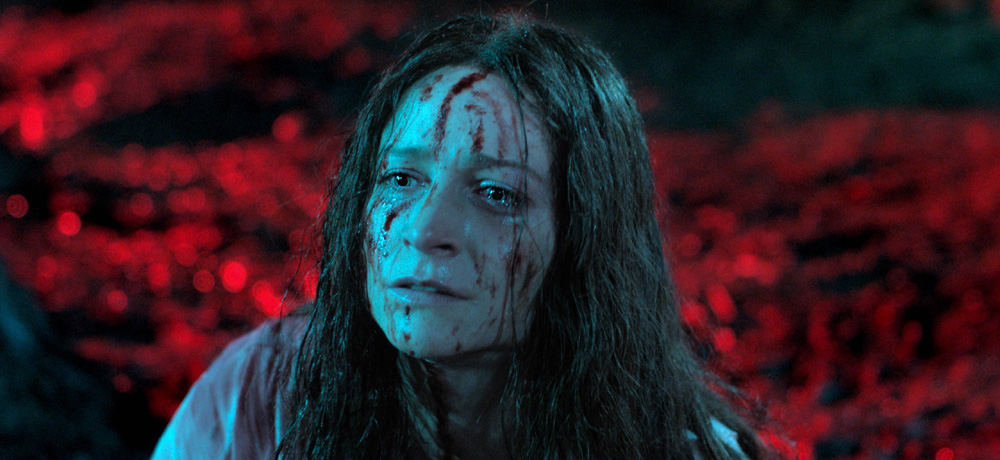






For her feature film debut, co-writer and director Prano Bailey-Bond leaves one helluva mark with Censor, a gorgeously disturbing throwback steeped in an authentic grunginess that masterfully explores the all-consuming nature of emotional trauma and how those wounds can fester if we leave them unattended over time.
Censor introduces us to Enid (Niamh Algar), a film censor working in the U.K. in the mid-1980s whose job it is to go through movies, generally those that would be dubbed under the infamous “Video Nasty” label that was created by the British government as a means to ban and/or neuter the gore films from that era. While tasked with watching one of the archived films, Enid is left unraveled when the story in the movie begins to unlock memories from her childhood that involve the disappearance of her sister Nina whose fate still remains a mystery. From there, Enid is determined to try and figure out just how this movie might be intertwined with what happened in the past, but nothing can prepare her for the living nightmare that awaits her as art and reality violently crash into each other, all while Enid’s fragile psyche rapidly deteriorates.
It would seem that, based on the synopsis, that Censor would primarily be about the issue of film censorship, but really, that’s only one minor aspect of what Bailey-Bond is exploring here. In fact, the fact that Censor takes place during the 1980s is really just window dressing here, so to speak, and the work that Enid does becomes an allegory for what unfolds in the latter half of Censor and a vessel for her journey. Censor never quite goes as far as the subject matter that drives the narrative that Bailey-Bond has crafted here with Anthony Fletcher either, but that’s not really the point. We get glimpses of the terror that is consuming Enid (and a few gnarly moments of gore), and that’s enough for Censor to be able to crawl right up under your skin.
Primarily, the story at the heart of Censor is about grief and how our own sense of guilt can tear us apart from the inside out, and in some ways, it can even fracture our memories in an effort to protect ourselves from the pain and trauma we’ve experienced over time. Enid is clearly haunted by the uncertainty of her sister’s fate, and what role she played in her disappearance. It’s that sense of duty that drives her in her profession, where she is compelled to keep people “safe” because she feels like she failed in that capacity so many years ago.
I don’t want to go too deeply into just how far Enid travels down the rabbit hole in Censor, so that you can enjoy that journey for yourselves. But I will say that it’s during the film’s third act where Bailey-Bond really delivers up some gorgeously haunting nightmare fuel that wades into some wildly unpredictable waters, and the film’s final moments left me in total stunned silence, akin to getting the wind knocked right out of you and your not exactly sure how your body should react. There are bound to be some comparisons made between this aspect of the film and the conclusion of Saint Maud, but I think Censor nails what it’s trying to do better (but admittedly, both left me extremely rattled, in the best possible way).
While there’s a lot to appreciate about Censor, what really made the movie so wholly unforgettable for me was Algar’s performance. Enid feels so relatable, so fully realized here, and Algar approaches the character very thoughtfully, where even just the way she fidgets with her fingers or walks through her office feels so natural but so quietly deliberate all the same. Also, I think it’s interesting that for Censor, Bailey-Bond has centered her narrative around a figurehead in the world of film that most of us horror fans have come to see as a villain. We don't like seeing movies censored or edited, and most of us don’t appreciate when others impose their morals onto us, and yet, Algar makes Enid a character that you empathize with, and I thought that examining the experiences of a film censor from this perspective was extremely interesting and isn’t something that we see very often either.
As mentioned, there are many people out there who will make comparisons between Censor and Saint Maud, but to me, I felt like Bailey-Bond’s feature film debut would pair incredibly well (or maybe even better) with Peter Strickland’s Berberian Sound Studio, as both films astutely examine the insidious nature of art and how it affects the lives of those who are on the outside, looking in. Without a doubt, the years that Bailey-Bond has spent creating unforgettable horror shorts have served her well, as Censor is crafted with pure confidence, and the way that she masterfully blends formats and perspectives has made this an early contender for one of my favorite films of 2021.
Movie Rating: 4.5/5